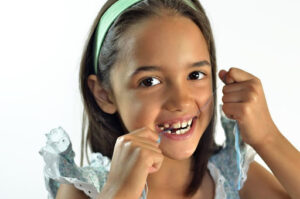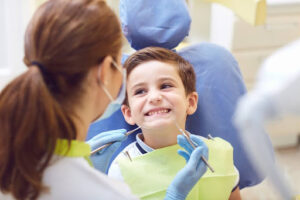As health-oriented professionals, dentists completely approve of childhood sports. They’re amazing activities for encouraging life-long healthy habits, building good social skills, and overall, living a higher quality life far beyond childhood.
However, as teeth experts, we also know how many young children come into our offices suffering serious dental injuries because of their athletic endeavors.
Today, we’re going to walk you through several pediatric dentistry tips for athletes to help protect your young athlete’s teeth so they can both enjoy sports and avoid dental problems in the future.
Let’s dive right in!
Maintaining Good Oral Health is the Core of Protecting Your Child’s Teeth
The best thing you can do is ensure your child has the best oral health possible from the start.
This not only helps improve their life in general by helping them avoid cavities, staining, and issues later such as rotting teeth or sensitivities, but strong, healthy, teeth are a lot less likely to become damaged or get knocked out due to sports-related incidents.

For example, if your child has a bad tooth with an untreated cavity and a fissure, when they inevitably take a hard fall or someone else’s child collides with them, that damaged tooth is a lot more likely to break or fall out than if the tooth had been in perfect shape.
Of course, such dental injuries can still happen regardless of how good your child’s dental health is. So, this is simply a way to reduce the likelihood of such issues; not remove it entirely.
Here are the things you should be doing as a parent to help maintain your child’s dental health and reduce the chance of a serious dental injury occurring.
1: Brush Twice Daily
This, and most of the pediatric dentistry tips for athletes in this section, are things you might already be aware of.. After all, they’re the basics of oral hygiene and good dentists inform you of these things.
Having your child brush their teeth twice daily, starting around a year or two of age, is the most basic and effective oral hygiene practice possible. Brushing removes plaque and debris, and most toothpaste is infused with enamel-building substances and cavity protection.
Even if you forget everything else occasionally, make sure your child is brushing at least twice daily.
2: Floss When Brushing
Every time your child goes to brush your teeth, have them floss, too. Toothbrushes, while highly effective, aren’t perfect. They struggle to clean the tight gaps between teeth.
Flossing allows your child to remove jammed gunk and debris to prevent those things from rotting, feeding bacteria, and creating cavities.

Depending on how old your child is, this might be easy, or it might be challenging.
If your child is younger, and they have issues maneuvering traditional dental floss with their fingers, it might be worth trying the small floss picks until they get the hang of sliding floss between their teeth.
3: Proper Diet
Your child won’t be happy about this, but cutting back on candy and other sweets is crucial. A sweet treat here and there isn’t the end of the world, but consuming them daily leads to cavities and enamel degradation that will make dental injuries more likely.
When your child does have a sweet treat, make sure to time it close to when they’ll be brushing their teeth, or have them add another tooth brushing session into their routine that day to get rid of any acids or sugars as quickly as possible.
4: Xylitol Supplements
Finally, try to work Xylitol into your child’s daily routine.
Xylitol is a natural sugar alternative that provides an enjoyable sweetness, but instead of destroying your child’s teeth, it actively destroys bad bacteria in their mouth that cause dental health problems. So, your child can have sweet food items in the form of healthy treats for kids.
The easiest way for you to add Xylitol to your child’s diet is via Xylitol gum. It’s cost-effective, easy to find, and it’s the best gum for children’s teeth out there.
If you have them chew a piece two to three times per day, they’ll enjoyably get the benefits of Xylitol.
You can also buy Xylitol sweetener that comes just like normal sugar, and you can use that to sweeten smoothies, make dried fruit candies, and other things that can replace traditional sweets.
Just make sure you don’t overdo it. Xylitol is healthy, but when it’s taken in massive amounts, it has some negative side effects. Luckily, you’d have to give your child a lot more than is reasonable to achieve that.
Take Safety Precautions
Of course, having your child brush their teeth, floss, and overall, maintain good oral hygiene isn’t going to completely remove the possibility of a dental problem.
Things happen with sports, and they can easily take a hard fall or collide with other athletes resulting in a fissure in their tooth or missing teeth. That’s just part of being an athlete.
However, there are plenty of pediatric dentistry tips for athletes that can help you minimize the chance of that happening.
Depending on the sport your child is in, there might already be safety precautions in place specifically for this.
For example, a football helmet is primarily to prevent brain injuries since it’s such an intense sport, but the faceguard does prevent collisions with your child’s face. Greatly reducing their chances of dealing with an oral injury.
That’s true for a few sports. Hockey tends to protect athletes’ faces when they’re in positions where an impact is likely, and baseball has some positions with face protection. However, not every sport does, and not every position in every sport offers face protection.
In that case, it’s far more important to focus on two things:
- Implementing your safety precautions
- Identifying unnecessary risks and correcting them
By implementing your safety precautions, we mean buying your child a mouthguard. There isn’t much else you can do.
You can’t buy a football helmet for your young baseball player or any similar equipment. So, the next best option is to get a good mouthguard that is made by a reputable company.
A mouthguard does two things.
First, it helps stabilize the teeth and provides a layer of protection from impacts. It’s not perfect, and a hard enough impact will still damage your child’s teeth, but it’s better than nothing.
Then, it helps stop the most common oral injuries that occur from the lower jaw slamming upward suddenly. The guard will prevent the teeth from chipping or cracking each other in the event your child’s chin hits the ground, their head gets whipped quickly, and similar situations.
The second thing you can do is help your child identify risks and avoid them.
For example, imagine they’re on 3rd base for their baseball team, and you notice they position themselves to catch the ball right before it hits them in the face. Sure, they might be fine right now, but they’ll eventually miss that catch and end up with a serious dental injury.
Identifying that habit and working with them to correct it is not only better for their athletic performance, but it also prevents serious injuries. This is just one example, but any time your child is doing something dangerous, it’s best to correct that behavior.
Of course, many coaches will do this, as well. They know the sport they’re teaching your child, and they have likely seen their fair share of injuries. Unfortunately, they have to pay attention to many kids at once. So, you still need to pay attention.
If you’re not very knowledgeable about sports or what’s going on, bring any concerns you have to your child’s coach. They’re equipped to handle it, and they might just need to be tipped off if something is wrong.
Know When Something Has Happened
Next, you can try to prevent dental injuries as much as possible, but there is always a chance your child will suffer one. When your child is an athlete, that possibility is exponentially more likely.
Being aware of specifics in sports dentistry for children will help you stay on top of any potential dental injuries.
Kids can take a hard fall and bounce their chin, and as long as they’re not crying or showing signs of extreme pain, it gets blown off.
That or adults don’t think about dental problems that could have occurred and focus on ensuring much more noticeable issues, such as broken bones, don’t pop up.
After something happens and an injury is possible, check your child’s mouth. Look for chips, fissures, missing teeth, bleeding, or any other signs of a dental injury as soon as you can get to them.
This might be difficult. When your child is in the heat of the moment trying to make the game-saving pass, they have a lot of adrenaline pumping, and they might not even notice a missing tooth or a chip until much later. This is why you have to take the initiative and check.
A good time to do this is after each game or practice.
By checking, you can catch minor dental injuries sooner and take action that prevents them from becoming major problems.
Remember, any break in the enamel, such as a small chip, can create serious issues going forward thanks to the inner tooth being exposed to bacteria, weakening, and eventually, completely breaking.
Have a Pediatric Dentist on Standby
This isn’t just something for the parents of athletes. Every child should have a pediatric dentist they go to regularly.
However, since young athletes are more likely to experience dental emergencies, it’s even more important that you have someone you can trust to handle such situations.
By having a pediatric dentist as part of your child’s larger health support system, you gain a few major benefits.

First, their pediatric dentist will help them maintain their general oral health.
All those things we talked about earlier in this guide will be checked, recommendations will be made, and supplementary treatments will be offered if needed such as braces, more in-depth tooth cleanings, cavity fillings, etc.
You can do an amazing job promoting good dental care at home, but having a professional guide to those care habits makes a huge difference.
Then, you also know you have somebody there to help correct minor dental injuries that might occur instead of letting them get worse.
As we said, the dentist can fill cavities or provide braces, but they can also take care of chips, fissures, missing teeth, and other problems that might not be extremely serious but are likely to cause problems if left untreated.
Finally, you have to think about dental emergencies. Unfortunately, it can take a long time to get an appointment with a new dentist. Dentists can only take on so many patients, and there are often waiting lists before a new patient can be seen.
What happens if your child suffers a serious dental emergency, such as a wide-open fissure that leaves an exposed nerve, and you don’t have a dentist set up for them? They might be stuck waiting a week, or even a month, to get that taken care of.
In contrast, if you have a general pediatric dentist as part of their team now, you can call them up and get your child seen as soon as the dentist is available. Your child gets help faster, they go through a lot less pain, and further issues are unlikely to develop.
Get the Best Pediatric Dentist Available
Of course, the pediatric dentist you get into your child’s health support system is important, too.
When speaking of sports dentistry for children, you want someone who can balance kid-friendly services, reliability, and the best service possible. Your young athlete’s dental health depends on it.
Dino Kids Dental is the pediatric dentistry for you.
Our team consists of only the most qualified pediatric dentists available, and we’ve put extra attention into creating a dental care atmosphere that is kid-friendly and focused on making going to the dentist a joy.
Contact us today and let your child have access to the best dental services for kids!


